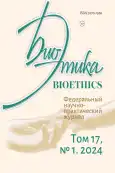Смыслы ценности достоинства человеческой жизни и геноевгени-зация
- Авторы: Силуянова И.В.1
-
Учреждения:
- Российский национальный исследовательский медицинский университет имени Н. И. Пирогова
- Выпуск: Том 17, № 1 (2024)
- Страницы: 13-18
- Раздел: Теоретическая биоэтика
- URL: https://journal-vniispk.ru/2070-1586/article/view/256737
- DOI: https://doi.org/10.19163/2070-1586-2024-17-1-13-18
- ID: 256737
Цитировать
Полный текст
Аннотация
Обоснование. Среди направлений современного научно-технического развития одно из лидирующих мест занимают новые технологии медицинской генетики: генетическое редактирование генома эмбриона человека (эмбриоинженерия), медико-генетическое консультирование, пренатальная, неонатальная, преконцепционная диагностика наследственных заболеваний, технологии отбора и селекции эмбрионов, терапевтическое и репродуктивное клонирование человека и др. Возникает вопрос: как воздействуют генетические технологии и развитие геномной медицины на изменение общественного и индивидуального сознания, и прежде всего на значение смыслов ценности и достоинства человеческой жизни?
Цель: рассмотреть основные результаты развития технологий геномной медицины, таких как рост выявления генетических заболеваний, возрастание потребности в евгенических абортах и использования эмбрионов в исследованиях, внедрение генетического тестирования.
Материалы и методы. Исторический и логический метод исследования, а также историко-философский подход позволяют автору выявить не только этическую новизну проблем генетизации здравоохранения, но и новую форму социального воплощения идей натуралистическо-прагматической этики.
Результаты. Ценностно-мировоззренческое осмысление последствий развития технологий геномной медицины приводит к необходимости введения понятия «геноевгенизации» как характеристики морального смысла происходящих в обществе процессов под влиянием внедрения новых медико-генетических практик.
Заключение. Автор обосновывает значение гуманитарно-образовательного, юридического и морально-философского уровня знания для решения задач сохранения традиционной морально-нравственной ценности достоинства человеческой жизни.
Полный текст
Открыть статью на сайте журналаОб авторах
Ирина Васильевна Силуянова
Российский национальный исследовательский медицинский университет имени Н. И. Пирогова
Автор, ответственный за переписку.
Email: siluan@mail.ru
ORCID iD: 0000-0001-9321-9519
доктор философских наук, профессор, кафедра биоэтики, почетный профессор
Россия, МоскваСписок литературы
- Социогуманитарные контуры геномной медицины. Коллективная монография. М.: ИНИОН РАН, 2021. 232 с.
- Биомедицинская этика // Сборник нормативно-правовых документов в области прав человека в кон-тексте биомедицинских исследований / под ред. И.В. Силуяновой. Москва; Чебоксары: Изд-во Чувашского университета, 2014. С. 304–394.
- Св. Лука Крымский. Я полюбил страдание… Автобио-графия. М., 2001. 79 с.
- Бужиевская Т.И. Евгеника: 100 сто лет спустя // Чело-век. 1996. № 1.
- Agar N. Liberal Eugenics // Defence of Human Enhance-ment. 2004. ISBN 1-4051-2390-7. URL: https://ru.wiki-pe-dia.org/wiki/%D0%9D%D0%BE%D0%B2%D0%B0%D1% 8F_%D0%B5%D0%B2%D0%B3%D0%B5%D0%BD%D0%B8%D0%BA%D0%B0
- Agar N. Why we Should Defend Gene Editing as Eugenics // Cambridge Quarterly of Healthcare Ethics. 2019. No. 28 (1). P. 9–19. URL: https://www.cambridge.org/ core/jour-nals/cambridge-quarterly-of-healthcare-ethics/article/abs/why-we-should-defend-gene-editing-as-eugenics/00B15A EB625379F8543C43E286160B87.
- Ницше Ф. Сумерки кумиров. Соч. в 2 т. Т. 2. М.: Изд-во «Мысль», 1990.
Дополнительные файлы







